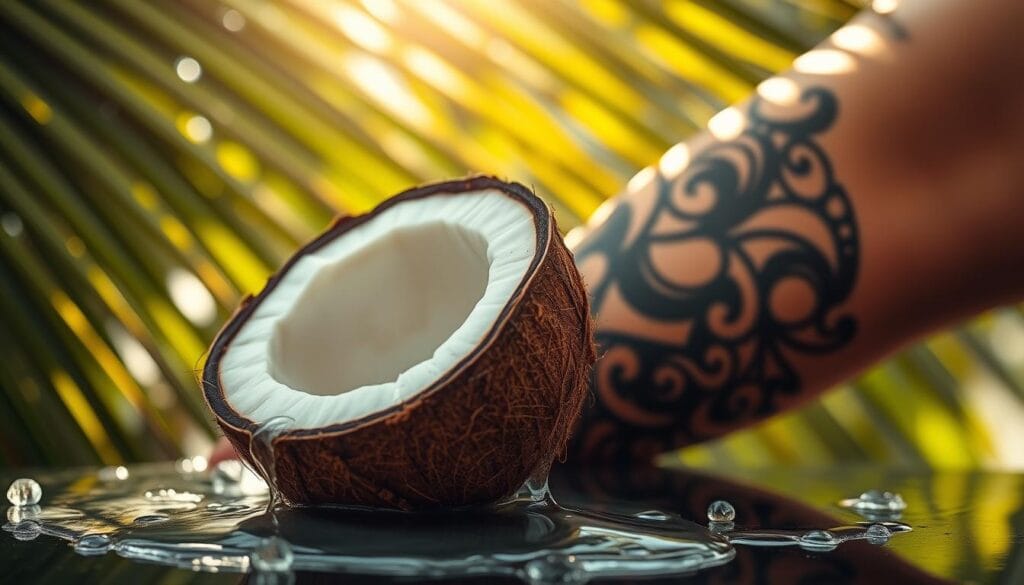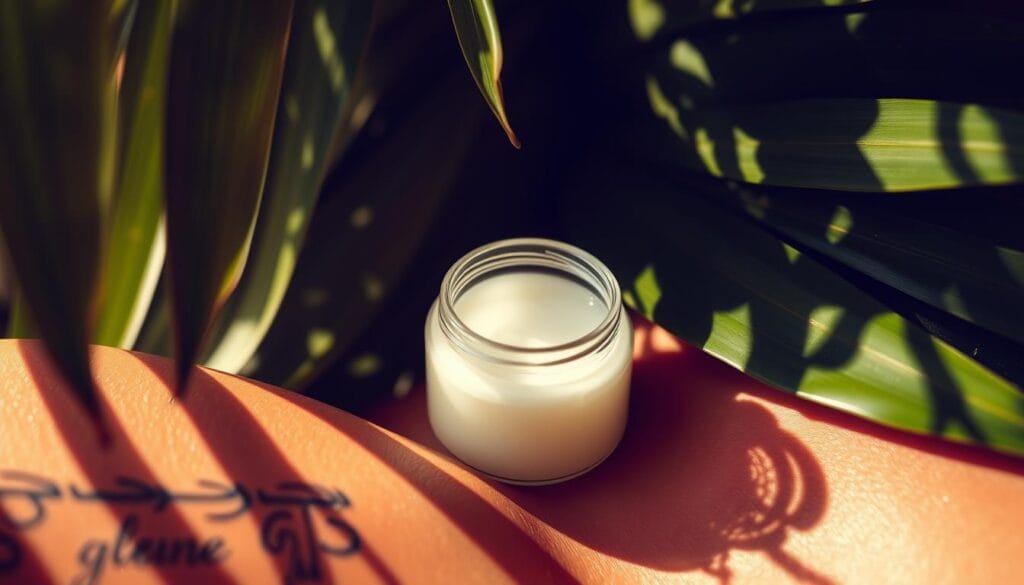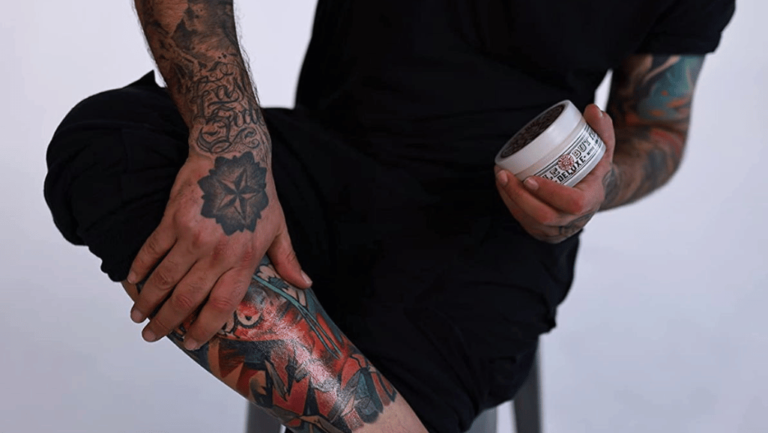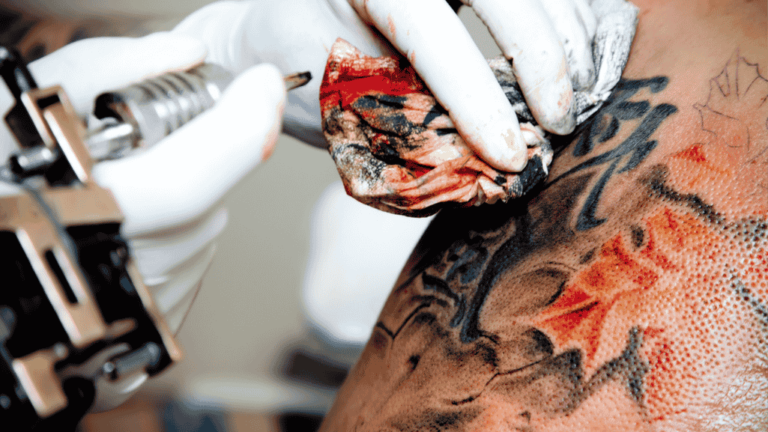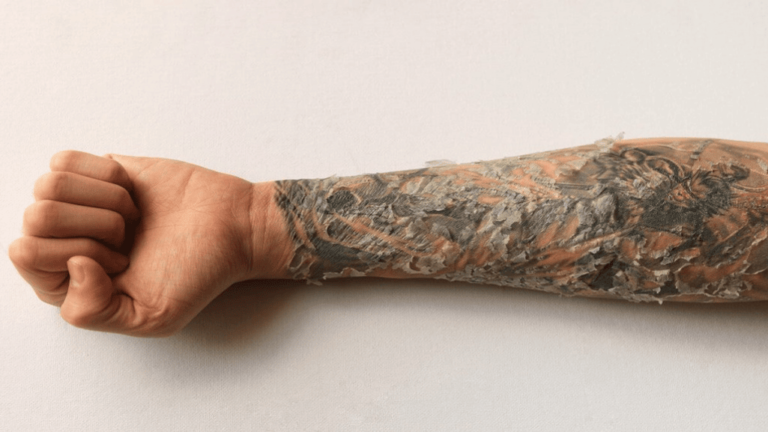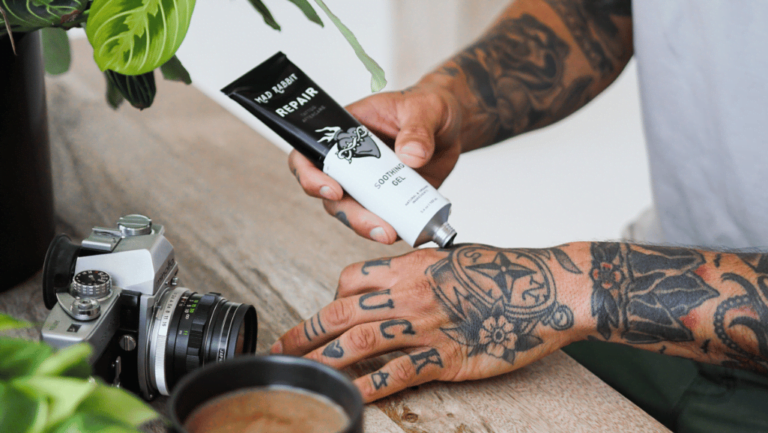For centuries, coconut oil has been loved for its skin benefits. It’s been used for ages as a natural remedy. Now, it’s also used for tattoo aftercare, thanks to its vitamins and fatty acids.
This natural solution is great for tattoo care. It helps tattoos heal and stay vibrant. It’s a go-to for those who want the best for their tattoos.
Coconut oil is known for moisturizing and fighting off germs. It’s a natural and affordable choice for tattoo care. It works well for all skin types, making it a key part of tattoo aftercare.
Coconut oil’s use in tattoo care brings ancient wisdom into today’s world. It’s a legacy passed down through generations. Each time it’s used, it brings new life to tattoos.
Key Takeaways
- Coconut oil has been a revered skin treatment for millennia, enhancing skin health when applied topically.
- Essential fatty acids within coconut oil, such as lauric acid, have notable antibacterial properties.
- Rarely causing allergic reactions, coconut oil is generally safe, but a patch test is suggested prior to tattoo application.
- Natural products like Sanibalm blend coconut oil with other healing ingredients to optimize tattoo aftercare.
- Research champions coconut oil’s ability to foster expedited healing and to preserve tattoo vibrancy.
- With benefits surpassing even some brand-name moisturizers, coconut oil offers an effective and economical aftercare option.
- Contact dermatitis is a rare but possible side effect to be mindful of when using coconut oil on sensitive skin.
The Historical Use and Modern Rediscovery of Coconut Oil in Skin Care
Coconut oil has been valued for centuries. It’s now a key part of modern tattoo care. It’s known for its healing properties, used in ancient times to treat wounds and nourish skin.
Ancient Traditions Meet Modern Tattoo Aftercare
In Pacific tribes and coconut-rich areas, coconut oil is a staple for tattoo care. It soothes the skin, reduces swelling, and fights off infections. This makes it perfect for tattoo healing.
Ancestral Wisdom: Coconut Oil’s Healing Properties
Coconut oil is celebrated in Ayurvedic and folk medicine. It’s packed with fatty acids and antioxidants. These help tattoos heal faster, keep colors bright, and strengthen the skin’s barrier.
A Shift Towards Natural Healing in the Tattoo Community
The tattoo world is moving towards natural aftercare. Brands like Nutiva Organic, Shea Moisture, and Viva Naturals lead the way. They offer high-quality coconut oil for soothing new tattoos.
The Crafted Coconut’s oil stick makes applying coconut oil easy and mess-free. It’s a modern solution for tattoo care.
Lion tattoos symbolize strength and courage, much like coconut oil’s healing power. This natural oil aids in the skin’s healing after a tattoo, blending tradition with modern use.
Temporary tattoos, like those from Nailmatic x Musée d’Orsay, also celebrate art and culture. They’re safe and creative, much like coconut oil’s historical use.
By using coconut oil, we’re not just healing tattoos. We’re also joining a movement towards eco-friendly and holistic health care.
Coconut Oil’s Role in Tattoo Healing and Maintenance
Coconut oil is great for both new and old tattoos. It has lauric acid, which fights off bacteria. This is key for keeping the tattooed skin safe from infections.
Coconut oil also has vitamins E and A. These vitamins help the skin heal faster and keep the tattoo looking bright. It also makes the tattooed area feel better by reducing stress.
Coconut oil is more than just for healing. It’s good for sensitive skin and doesn’t cause allergies. You can use it on tattoos for up to two years without keeping it in the fridge.
To use coconut oil, apply a thin layer 2-3 times a day in the first week. After that, cut back to once or twice a day. This keeps the tattoo moisturized.
Learn more about coconut oil’s benefits
| Benefits of Coconut Oil | Application Tips | Additional Uses beyond Tattoo Care |
|---|---|---|
| Antibacterial, prevents infections | Apply thin layer 2-3 times daily | Makeup remover, hair conditioner |
| Reduces inflammation and pain | Reduce application after one week | Body moisturizer, homemade toothpaste |
| Supports skin regeneration | Use clean hands to avoid contamination | Helps with acne and eczema |
In short, coconut oil is a top choice for tattoo care. It’s natural and works better than many commercial products.
Integrating Coconut Oil into Your Tattoo Aftercare Routine
Using coconut oil for tattoo care is a great way to keep your tattoo looking good. It helps heal the skin and keeps the tattoo vibrant. Coconut oil is known for its natural healing and soothing effects.
How to Apply Coconut Oil on Tattoo
Wait until your tattoo starts healing before using coconut oil. This can take anywhere from 24 hours to 4 days after getting the tattoo. First, clean the tattoo with mild soap and water. Dry it with a clean cloth.
Then, apply a small amount of coconut oil to your fingers. Gently dab it over the tattoo. Make sure it’s covered but not too much.
Identifying the Best Coconut Oil for Your Tattoo
Choose coconut oil that’s labeled ‘virgin’ or ‘cold-pressed.’ These are processed without heat, keeping more natural goodness. Make sure it’s free from additives, preservatives, and fragrances to avoid irritation.
| Property | Benefits |
|---|---|
| Antimicrobial | Prevents infections by inhibiting bacterial, viral, and fungal growth |
| Anti-inflammatory | Reduces swelling and soothes redness around the tattoo |
| Moisturizing | Helps retain skin’s moisture, keeping the tattoo and surrounding skin hydrated |
| Healing Support | Supports wound healing by promoting the formation of new blood vessels |
| Availability | Widely accessible due to global abundance of coconuts |
| Versatility | Can be used for other skincare needs like makeup removal and improving hair health |
Coconut Oil: A Natural Solution for Ongoing Tattoo Care
Coconut oil is good for both healing and keeping your tattoo looking great. It keeps the tattoo moisturized and vibrant. Using it regularly is key to maintaining your tattoo’s health.
Be careful with coconut oil, especially if you have sensitive skin. Use a thin layer to avoid clogging pores. Following these tips will help you get the most out of coconut oil for your tattoo care.
Addressing Common Concerns: Coconut Oil and Tattoo Longevity
Proper aftercare is key to keeping tattoos looking great. Coconut oil is often debated for its role in tattoo care. People wonder if does coconut oil fade tattoos and if it helps prevent scarring. Let’s look at the facts and myths about coconut oil for tattoo fade.
Debunking Myths: Does Coconut Oil Fade Tattoos?
There’s no proof that coconut oil makes tattoos fade. Its hydrating properties help tattoos heal better. Keeping the tattoo moisturized prevents dryness and ink loss.
The Science Behind Coconut Oil and Ink Preservation
Coconut oil’s fatty acids create a skin barrier. This protects the tattoo ink from the environment. It also helps prevent scarring by improving skin elasticity and regeneration.
Coconut oil enhances healing and keeps tattoos looking vibrant. Regular use can make your tattoo last longer and look better.
It’s important to use coconut oil correctly. Too much can clog pores or cause moisture buildup. Follow your artist’s advice for the best results.
Exploring other aftercare options is also good. Products like After Inked or Hustle Butter offer specialized care. Each product has its own benefits for different skin and tattoos.
In conclusion, coconut oil is good for tattoo care but should be part of a complete aftercare plan. This plan includes professional advice and understanding your healing process. Proper care, including coconut oil, is essential for a vibrant tattoo.
Conclusion
The journey of healing tattoos with coconut oil is a natural approach. Coconut oil has been used for ages in skincare. It brings its nourishing benefits to tattoo care too.
The coconut oil benefits for tattoo healing are many. It moisturizes, reduces inflammation, and fights infection with lauric acid. This makes for a complete healing method.
Coconut oil works well with all skin types, even sensitive ones. But, it’s important to use 100% pure, food-grade coconut oil for tattoos. This type lasts longer and keeps your tattoo hydrated with daily use.
Even though allergic reactions are rare, always do a patch test first. This ensures your tattooed skin is safe.
Coconut oil is great for all tattoos, new or old. It’s affordable, easy to use, and works well at any stage. It keeps your tattoo clean and protected from the sun during healing.
Choosing tattoo aftercare coconut oil means you’re dedicated to your tattoo’s health. Shalimar’s Coconut Oil and VedaOils offer high-quality organic coconut oil for tattoo care.
FAQ
What are the main benefits of coconut oil for tattoo aftercare?
Can using coconut oil on a new tattoo aid in the healing process?
How should coconut oil be applied to a tattoo?
Is coconut oil suitable for old tattoos as well?
What type of coconut oil is best for tattoos?
Does coconut oil fade tattoos over time?
How often should coconut oil be applied to a tattoo?
Are there any concerns for using coconut oil on tattoos?
Forhad
Forhad's writing is not just about the artistry of tattoos or the latest trends in the industry; it's an exploration of the deep-rooted connections people have with their tattoos, reflecting personal narratives, cultural histories, and moments of transformation. Through a mix of in-depth features, personal narratives, and insightful analyses, he sheds light on the multifaceted nature of tattooing, revealing the emotional and cultural layers that lie beneath the surface.



